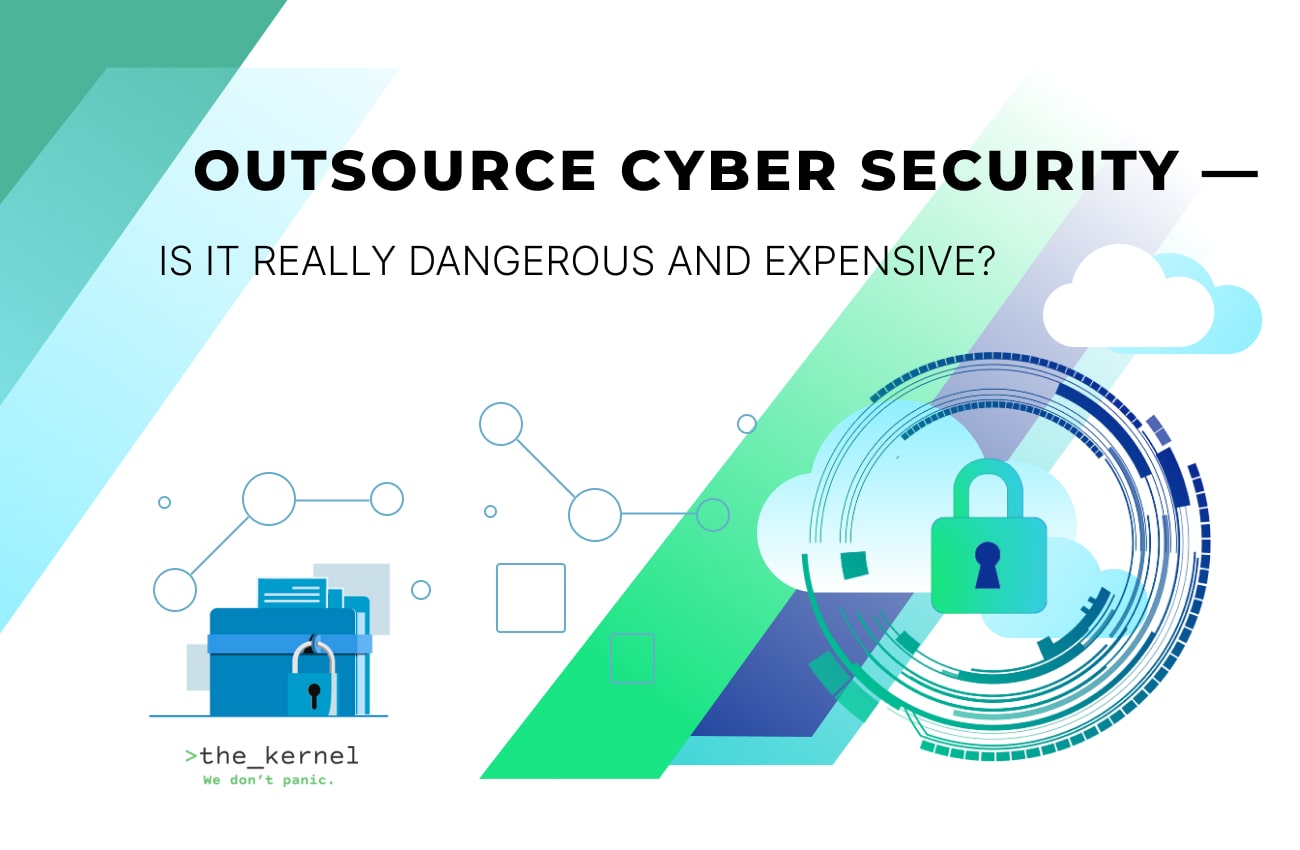Students and schoolchildren show a lot of interest in this issue. Therefore, the number of people willing to try to hack someone’s security system is constantly growing. Artificial intelligence, such as ChatGPT and OpenAI, can also help cybercriminals in this regard.
At the same time, many companies, even large ones, cannot afford to keep separate security specialists on staff to test the system for vulnerabilities and build obstacles for fraudsters. So the best way out of this situation is outsourcing.
The thing is, security issues are usually passed on to developers. This may seem like a good solution, but the latter have a lot of other tasks, so they may not have time to keep up with trends and new technologies. In general, it is difficult to be a specialist in several areas at the same time. Например, разработчик может установить антивирусное программное обеспечение, но не сможет расследовать инцидент вторжения.
Why do some companies hesitate to outsource? The answer is simple: the topic is new and not well understood, so it is covered with myths. Most people think it’s too expensive, it’s better to do it in-house, and it’s not safe because unauthorized people will get access to important data. Also, many people expect to see people in white collars and ties who look sophisticated but look like the embodiment of a certain danger, and who give vague and unclear advice.
Let’s find out if outsourcing is really as scary as people think.
What we are going to talk about:
- What is cybersecurity outsourcing?
- What is included in outsourcing services
- Who needs cybersecurity outsourcing
- Security outsourcing and information leakage
- Will outsourcing really be more expensive than an in-house team
- How to minimise outsourcing costs
What is cybersecurity outsourcing?
Cybersecurity outsourcing is a model for businesses to receive relevant services that are limited in terms of time and do not require in-house staff. Such services may be one-off or provided periodically, but they should ensure the smooth operation of the infrastructure, provided that the instructions are followed over time. For example, until the warranty period for software or hardware expires (usually within a year).
What is included in outsourcing services
Different companies may specialise in different areas of cybersecurity services. For example, this:
- Cybersecurity audit to assess security.
- Testing for DDoS attacks to find vulnerabilities.
- Investigate incidents to identify the impact of fraudsters.
- Reputation management to improve brand ratings.
- Захист конфіденційних даних для уникнення витоку інформації.
- Access and identity management to prevent hacking.
- Providing cloud services with enhanced security systems.
- Technical security features for enhanced authentication.
- Developing internal cybersecurity policies to prevent incidents.
- Providing certification services for managing public key infrastructure (PKI).
From this list alone, you can see that the areas are quite different, so it will be difficult for one person to cover them all. However, the team can include specialists from different fields (some have a better understanding of the psychology of fraudsters, some are skilled at analysing and developing instructions, and some are more familiar with the latest technologies), so they can close most customer requests while providing high-quality services.
Who needs cybersecurity outsourcing
Of course, not all companies may need to outsource cybersecurity. These services are usually ordered:
- Companies that lack the relevant narrow specialists.
- Businesses that cannot provide a sufficient workload for a specialist for the relevant role in the staff, so it is not advisable to keep them full-time.
- Businesses that do not have time to deal with cybersecurity issues on their own, for which it is important to build other processes faster.
- Organizations that, through the specifics of the business, can follow the same standards.
Cybersecurity outsourcing and information leakage
Let’s talk about the fear of information leakage due to third-party interference. Spoiler alert: it is impractical. There are several reasons for this:
- Companies that provide these services take great care of their reputation.
- Outsourcing does not imply a complete transfer of rights and access to contractors. The company continues to regulate all processes and provide relevant rights and access in a controlled manner, with prior approval and as necessary in a particular case.
- Before starting work, the outsourcing company enters into a Service-level agreement (SLA) on access levels and guarantees. This agreement describes in detail all types of services provided and penalties for breach of the agreement.
Another fact is that when people need the services of narrow specialists, such as a dentist or a nanny, they do not think about how dangerous it can be, and they are afraid of “white hackers”. However, cybersecurity services are just services like any other. There are certain risks in any profession, but experienced professionals know how to avoid them.
Will outsourcing really be more expensive than an in-house team
When a businessman cares about security, he thinks first about technology. For example, he learns about a firewall that monitors incidents and decides to buy it. But it turns out that:
- There are different types of firewalls (gateways, packet filters, managed switches, etc.), and you need to know which one will work best in a particular IT structure, as they have certain advantages and limitations;
- Even if you invest a lot of money in a high-quality network screen, you need to learn how to read the message correctly – whether it is related to the incident or not, and whether it will be necessary to reconfigure the equipment, build a new security system, or simply remove the threat.
There are many such examples. If you constantly invest in equipment and staff training/retraining, it will be much more expensive than ordering one-off services.
How to minimize outsourcing costs
Of course, in order to avoid overpaying for any services, you should try to understand the types of threats and possible protection systems beforehand. To do this, it is advisable to periodically attend various cybersecurity events, read the news or consult with experts. For example, the latest trends in information security include the use of cloud services and hardware-based methods of protecting accounts (smart cards, security keys, hardware modules).
Before each consultation with specialists, it is advisable to collect information and form a list of questions and wishes:
- you may want to give different accesses to the team (administrators usually have more rights than editors or authors, while ordinary users have limited options);
- perhaps you want to minimize the cost of maintaining your IT structure without having to buy additional equipment, servers, etc;
- Or maybe you suspect that someone in the team is working for a competitor and you need to identify this very correctly;
- perhaps you want to provide high quality service and test your system for vulnerabilities or protect yourself from the machinations of competitors.
Once you have formulated a list of questions, contact an information security company and request a consultation.
Be prepared to be provided with a list of additional questions, as specialists need to assess the scope of work before calculating how much the services will cost. Also, an experienced team can usually offer you several service options to solve your issues. After that, you’ll be able to decide which services to buy: security audits only, attack testing, software, cloud migration, hardware solutions, etc.
And our company, which has more than 30 years of experience in the industry, will be happy to help with your questions. Contact us if you need to build a reliable information security system!
Our other publications
YubiKey Smart Card Mode on macOS – convenient authentication for developers
Smart cards have been very popular for many years as a reliable means of identification, authentication, and authorization in businesses and educational institutions. They come in a variety of form factors: from a SIM card on a phone to a plastic card. However, if you...
OTP passwords on YubiKey — how it works
OTP passwords are one-time passwords (the origin of OTP is from English one time password) that are used for one authentication session. Their effect is usually limited by time. You may have received such codes by phone or mail when trying to access online banking or...
New challenges and threats of modern cyberspace in the era of ChatGPT: how is the criminal’s portrait changing?
OpenAI introduced GPT chat version 3 in late 2022, based on large language models. He knew how to hold a conversation like a real person, communicate in many languages, pass exams, write software code and even blog. Already after 2 months, the number of his supporters...




